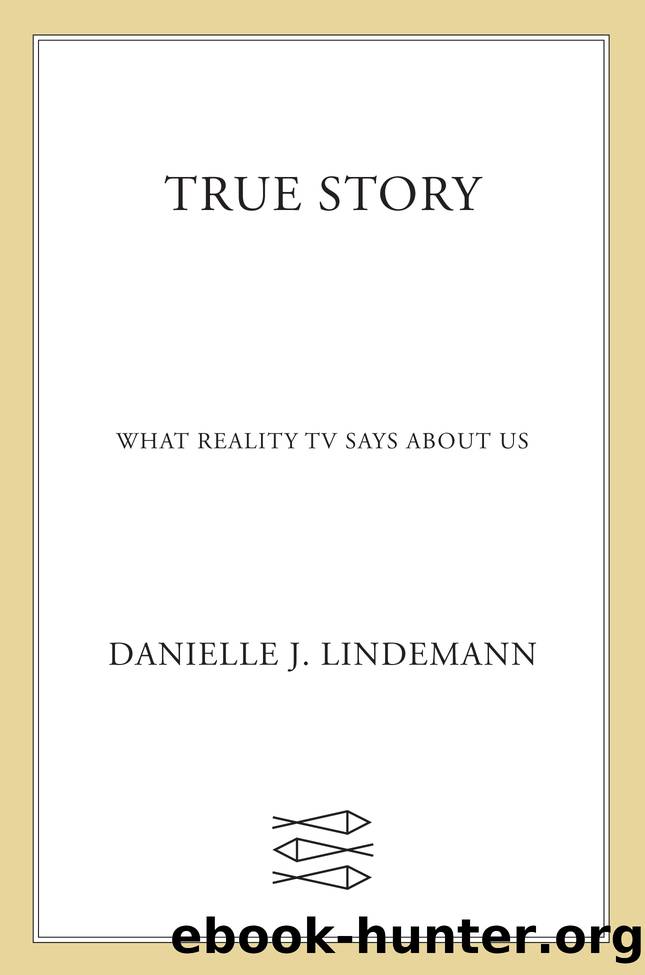True Story by Danielle J. Lindemann PhD

Author:Danielle J. Lindemann, PhD
Language: eng
Format: epub
Publisher: Farrar, Straus and Giroux
(THIS IS NOT AN ARGUMENT ABOUT) THE POLITICS OF REPRESENTATION
When people of color do appear on reality TV, are these portrayals ultimately more harmful or valuable? Where are we, the viewers, in all of this? When we tune in, are we morally culpable of perpetuating controlling images?
While these are not the questions on which I am focused, they are nonetheless important questions, and they have nuanced answers. Other authors have written extensively about the politics of representation on these shows. Some have critiqued these programs for bringing marginalized populations to the fore only to perpetuate their marginalization.73 Others have observed that the fact that reality TV is presented as ârealityâ may give these stereotypes particular life.74 But rather than, say, boycotting the negative portrayals of Black women on Love & Hip Hop, some have suggested that we can still consume these programs, albeit critically, applying an âoppositional gaze.â75
Others still, while acknowledging the problematic stereotyping on these shows, point out the potentially liberating qualities of some of these portrayals.76 They point out how Black women on reality TV, for instance, have been able to work within these stereotypical categories to earn money and to render themselves culturally visible.77 Weâve seen how Cardi B has used the category of âratchetâ to facilitate her superstardom. Shereé, to a lesser extent, has capitalized on âWho gonâ check me, boo?â; for example, she incorporated the catchphrase alongside an image of her own face on a T-shirt for her clothing line, SHE by Shereé. One of the few Asian American males on reality TV, William Hung from season three of American Idol, was able to capitalize on his public persona of the dorky Asian male who is clueless about his terrible singing. He parlayed the exposure into a successful, albeit brief, music career; his first album, Inspiration, sold about two hundred thousand copies.78
As reality stars become savvier about the ways these shows are produced and packaged, some become adept at working in and around intersectional stereotypes. One key example from Dance Moms is Holly Hatcher-Frazier, an African American former school principal. On the series, Abby Lee variously asked Hollyâs daughter Nia (the only Black girl in that cast) to wear a dog collar, to twerk, and to don a leopard-print outfit and Afro wig for a solo dance about a pimp character named âLaQueefa.â Holly registered nearly no emotion, even though she was arguably goaded into acting in accordance with the Angry Black Woman stereotype. Not only did Holly express her objections coolly, but she was a marked contrast to the white moms on the show who repeatedly got into heated confrontations with Abby Lee.
Holly appeared acutely aware of the burden of representation. This was true throughout her time on the series but particularly during season two, when the show briefly introduced another mother, whose name was Kaya but who went by âBlack Patsyâ and who aligned more closely with the Black Bitch archetype (and, indeed, appeared to be consciously working within this categorization). On the
Download
This site does not store any files on its server. We only index and link to content provided by other sites. Please contact the content providers to delete copyright contents if any and email us, we'll remove relevant links or contents immediately.
| Direction & Production | Genres |
| Guides & Reviews | History & Criticism |
| Reference | Screenwriting |
| Shows |
Robin by Dave Itzkoff(2427)
Head of Drama by Sydney Newman(2280)
I'm Judging You by Luvvie Ajayi(2188)
The Paranormal 13 (13 free books featuring witches, vampires, werewolves, mermaids, psychics, Loki, time travel and more!) by unknow(2082)
Ten by Gretchen McNeil(1869)
Single State of Mind by Andi Dorfman(1802)
#MurderTrending by Gretchen McNeil(1649)
Key to the Sacred Pattern: The Untold Story of Rennes-le-Chateau by Henry Lincoln(1617)
Merv by Merv Griffin(1607)
Most Talkative by Andy Cohen(1580)
Notes from the Upside Down by Guy Adams(1462)
This Is Just My Face by Gabourey Sidibe(1456)
The Hunger Games: Official Illustrated Movie Companion by Egan Kate(1424)
Springfield Confidential by Mike Reiss(1404)
Binging with Babish by Andrew Rea(1398)
Jamie Oliver by Stafford Hildred(1380)
The TV Writer's Workbook: A Creative Approach To Television Scripts by Ellen Sandler(1338)
Clarkson--Look Who's Back by Gwen Russell(1333)
Blue Planet II by James Honeyborne & Mark Brownlow(1268)
